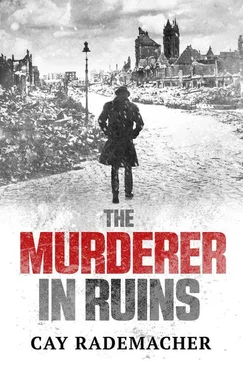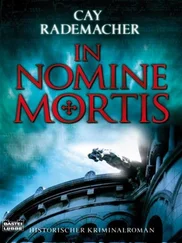Cay Rademacher - The Murderer in Ruins
Здесь есть возможность читать онлайн «Cay Rademacher - The Murderer in Ruins» весь текст электронной книги совершенно бесплатно (целиком полную версию без сокращений). В некоторых случаях можно слушать аудио, скачать через торрент в формате fb2 и присутствует краткое содержание. Год выпуска: 2015, ISBN: 2015, Издательство: Arcadia Books Limited, Жанр: Триллер, на английском языке. Описание произведения, (предисловие) а так же отзывы посетителей доступны на портале библиотеки ЛибКат.
- Название:The Murderer in Ruins
- Автор:
- Издательство:Arcadia Books Limited
- Жанр:
- Год:2015
- ISBN:9781910050750
- Рейтинг книги:5 / 5. Голосов: 1
-
Избранное:Добавить в избранное
- Отзывы:
-
Ваша оценка:
- 100
- 1
- 2
- 3
- 4
- 5
The Murderer in Ruins: краткое содержание, описание и аннотация
Предлагаем к чтению аннотацию, описание, краткое содержание или предисловие (зависит от того, что написал сам автор книги «The Murderer in Ruins»). Если вы не нашли необходимую информацию о книге — напишите в комментариях, мы постараемся отыскать её.
The Murderer in Ruins — читать онлайн бесплатно полную книгу (весь текст) целиком
Ниже представлен текст книги, разбитый по страницам. Система сохранения места последней прочитанной страницы, позволяет с удобством читать онлайн бесплатно книгу «The Murderer in Ruins», без необходимости каждый раз заново искать на чём Вы остановились. Поставьте закладку, и сможете в любой момент перейти на страницу, на которой закончили чтение.
Интервал:
Закладка:
MacDonald shrugged almost apologetically. ‘The woman was on her own, desperate, abandoned by her husband and sons. The neighbours avoided her. She couldn’t even give piano lessons any more because nobody wanted to be seen in her company. Back in London Ehrlich was like a caged tiger pacing up and down: he tried everything to bring her over – via Switzerland, the USA, Spain, Portugal. There was no way. Eventually in 1941 he received a message from the Red Cross that his wife had taken her own life with an overdose of sleeping tablets.
‘By then I had already got to know him. He had found lodgings in Oxford and was lecturing on Roman law. It would be exaggerating to say we had become friends. Nonetheless it was me who got him the job at the public prosecutor’s office here, a few months ago.’
‘You?’ Stave almost blurted out.
MacDonald gave him an ironic smile, and Stave found himself wondering just how much power this young officer wielded.
‘Ehrlich was keen to return to Germany – to help with the reconstruction, to build a democracy, as he put it. So I asked around amongst our people and came up with this. There is a shortage of legal personnel with a clean slate and we’re grateful for every non-Nazi we can find. Not just in the prosecutor’s office but in the police too.’
Stave vaguely recognised it as a compliment. ‘But why on earth Hamburg? Ehrlich must have a lot of scores to settle here. Not exactly the best qualification for a public prosecutor.’
‘On the contrary, an excellent qualification,’ MacDonald replied. ‘Herr Ehrlich is one of the plaintiffs in the Curio House case.’
Stave didn’t need any explanation. Since 5 December 1946 the house on Rothenbaumchaussee had been the setting for the trial of nine men and seven women who as guards at the female concentration camp at Ravensbruck were charged with responsibility for the deaths of thousands.
‘Does he have the time to take on a new case?’
‘He asked to be put in charge of it. Herr Ehrlich is a hard worker.’
After the lieutenant left the room, Stave sat there for a moment, thinking. Why Ehrlich? The Curio House case would give him opportunity enough to bring particularly nasty Nazis to the scaffold. Why would a politically motivated public prosecutor like him be interested in the naked corpse of an unknown woman? It looked like a hard case, for sure, but in no way political. Was it?
In the end he gave up, and got to his feet with a sigh. Maybe what attracted the prosecutor to the case was nothing personal at all, but just the very mystery attached to it. Then again, maybe he wanted to be in charge of a case the police fell down on, giving him the chance to cashier a few CID men who might have worked rather too closely with the Gestapo but got away without being sacked in 1945.
He was likely to find out soon enough. And Ehrlich was equally likely to find out what Stave had done in 1938 when the synagogues were being plundered. Absolutely nothing.
Hamburg Palace of Justice was a huge Renaissance palace with a bright red facade of light golden sandstone and tall white windows, some of them flanked by twisted columns: a great big nineteenth-century shoebox which, incredibly, managed to escape being hit by a single bomb in two world wars. It was in this fortress that the public prosecutor’s department had their offices.
Stave walked into the building. It was only a few paces across the square from the CID building, past the concert hall and through a neglected little park.
A few minutes later he was sitting on an uncomfortable visitor’s chair. Nervous, feeling like a schoolboy called in to see the headmaster, angry with himself for the way he felt but unable to do anything about it. He glanced around surreptitiously while the man sitting opposite leafed through documents in front of him.
Doctor Albert Ehrlich was a small, bald-headed man, with eyes swimming behind the thick lenses of old-fashioned horn-rimmed spectacles. He was in collar and tie with an English tweed jacket and razor-sharp pressed trousers. There were no photos of his wife or sons, nothing at all of a personal nature, just filing cabinets and sheets of paper and on a little table next to him a big black typewriter. Stave glanced furtively at Ehrlich’s short, chubby fingers covered with a light down and noticed he wore no wedding ring.
He no longer wore a wedding ring himself. One night in the summer of 1943 he had thrown it into the Elbe down by the harbour. The water was seductively close and dark … But he had turned on his heel and gone home, if that’s what you could call the ruins he inhabited. He closed his eyes for a moment.
‘I’m very sorry to have kept you waiting,’ Ehrlich said at last, closing the file in front of him. ‘Can I offer you tea?’ he said, in a quiet, cultivated voice.
Stave gave a timid smile. ‘Thank you, yes.’ And he opened his eyes wide to see a secretary come in with a steaming teapot that smelled wonderful. Real tea, Stave realised, Earl Grey even, rather than nettles with some hot water poured over them.
Ehrlich poured the tea. ‘I used to drink coffee,’ he piped up, ‘I only got used to tea during my time in England. It is a lot easier to get hold of, especially here in the British occupation zone.’
‘Is that why you came back to Hamburg, the chief port in the British zone?’
‘Ah, I can see Lieutenant MacDonald has already put you in the picture,’ Ehrlich replied with an amused smile. Stave thought there was something striking about his oversized owl-like eyes, something furtive.
You idiot, he told himself, typical CID attitude, ready to break into the conversation, take the man by surprise: not exactly the right way to deal with a public prosecutor.
‘Thank you for agreeing so readily to our request for an autopsy,’ he said, to change the subject.
Ehrlich sat back, relaxed: ‘Tell me about the case. I’m all ears.’
Stave told him what they had found out including the various theories about the victim and her possible attacker.
‘A difficult one,’ Ehrlich said at last when the chief inspector had finished.
‘The first thing is to find out who the victim is. Otherwise we’re never going to get anywhere,’ Stave admitted.
‘So you don’t think it was a robbery-motivated murder, despite sending Maschke off to find files on such incidents even though you know as well as I do that they’ve been burnt in a certain oven.’
He’s a wily one, thought Stave in surprise. In a mugging, the identity of the victim doesn’t necessarily lead to the perpetrator, as criminals often attack people they don’t know. Ehrlich must have decided that the victim and her attacker were acquainted and that Stave had an idea.
‘I’m simply trying to be efficient,’ he replied.
‘Ah, efficiency – a very German characteristic,’ the prosecutor replied, with just the slightest hint of irony.
‘A characteristic in criminal work everywhere,’ Stave shot back, regretting that they had got into this game of cat-and-mouse. ‘But you’re right,’ he added, in a conciliatory tone. Maybe he had suddenly come to trust Ehrlich, or maybe it was just the effect of the hot tea. Contrary to his normal habit of presenting prosecutors with no more than hard facts and the most plausible theories, Stave decided that this time he would mention something that was little more than the vaguest suspicion. ‘This crime was not just brutal,’ he ventured, hesitantly, ‘but also particularly efficient. Lethal force, resulting in immediate death. Then the thorough stripping of the body.’
‘Cold blooded,’ Ehrlich interjected.
‘Indeed. Carefully planned and perfectly executed. Someone capable of that has either had every sense of morality blunted – or is mentally ill but at the same time capable of logical reasoning.’
Читать дальшеИнтервал:
Закладка:
Похожие книги на «The Murderer in Ruins»
Представляем Вашему вниманию похожие книги на «The Murderer in Ruins» списком для выбора. Мы отобрали схожую по названию и смыслу литературу в надежде предоставить читателям больше вариантов отыскать новые, интересные, ещё непрочитанные произведения.
Обсуждение, отзывы о книге «The Murderer in Ruins» и просто собственные мнения читателей. Оставьте ваши комментарии, напишите, что Вы думаете о произведении, его смысле или главных героях. Укажите что конкретно понравилось, а что нет, и почему Вы так считаете.











